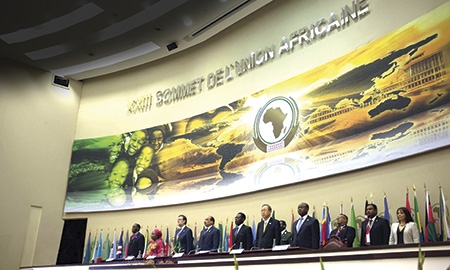At one time perhaps Africa’s least-known nation, the Republic of Equatorial Guinea is beginning to make news as the world learns of its extensive petroleum reserves and the government’s ambitious efforts to spend that largesse on improving the lives of the country’s almost 1.3 million citizens.
Foreign investors have poured into the country located in the heart of the west central African region on the Atlantic Ocean, lured by one of the world’s fastest growing economies which is fueled by proved petroleum reserves of more than 1 billion barrels of crude and 1.3 trillion cubic feet of natural gas.
Indeed, following a short dip in growth five years ago as the turbulence of the global economic crisis briefly buffeted Equatorial Guinea, the country’s economy has returned to annual growth of around 7%.
The World Bank lists the country as the wealthiest country per capita in Africa thanks almost entirely to its energy exports, which account for more than 90% of gross domestic product.
And with world oil prices expected to rise at least over the short term, the future of the nation seems assured as a great place to do business for intelligent investors.
But it is not only oil and gas which are driving investment. The government of President Teodoro Obiang is pouring billions of dollars into public projects to create and upgrade everything from highways, airports and ports to housing, health facilities and safe drinking water systems.
At the same time, just as in other countries wrenched out of poverty by sudden riches derived from natural resources, wealth is beginning to trickle down to the people, creating employment and a newly emerging middle class with its rising demand for improved living standards and consumer goods.
Equatorial Guinea has come a long way since its independence from Spain in 1968 when the former colony was largely broke, with few educated professionals and suffering under widespread repression and cruelty by
the then-president, Francisco Macias.
Following Macias’ ouster and the installation of Obiang as president, the country struggled as many other African nations have with a moribund economy, nascent steps towards democracy and corruption.
Over the past several decades, the situation has improved and the United States has begun to see Equatorial Guinea as an important partner in its diplomatic and economic strategy to help develop Africa.
Successive U.S. administrations have worked with President Obiang to further improve the country’s political freedoms, human rights performance, financial transparency and the standard of living of the average citizen, as well as the proper use of the country’s petroleum riches.
In commercial activities, most of Equatorial Guinea’s exported oil goes to the U.S. American companies in the oil, construction and security sectors have one of the largest foreign presences in Equatorial Guinea and relations are so close that the African nation allows American passport holders visa-free entrance, with the U.S. is only one of three countries to enjoy that privilege.
Certainly, the U.S. role in developing Equatorial Guinea can only grow as relations become even closer and more U.S. multinationals, both large and small, invest in one of Africa’s most vibrant economies.
Along with the oil and gas sectors, investment opportunities exist in other sectors such as hard woods, agriculture, tourism and consumer products as the country’s economy expands even further and Equatoguineans prosper.
Equatorial Guinea is evolving as one of the African continent’s true success stories and the United States is the government’s preferred partner to ensure that role and the country’s future.

0 COMMENTS